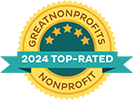Humble Leader / Quiet Impactful Voice
To those who’ve been members of House Rabbit Society for a while, who have meandered down the limitless bunny trails of old House Rabbit Journal issues on rabbit.org, who purchased one of the five editions of her iconic House Rabbit Handbook: How to Live with an Urban Rabbit, then you will recognize the name of Marinell Harriman. She is not only House Rabbit Society’s founder (seeming to have founded the first nonprofit of its kind) and past HRS president and recently retired board member, she is an incredible inspiration to continents of rabbit rescuers and guardians. She is among the pioneers of modern rabbit behavior observation as well as a champion and contributor of improved rabbit medical care, working in close conjunction with rabbit veterinary experts.
It was actually not Marinell’s original intention to create a world-wide movement on behalf of rabbit rescue. She did not foresee that generations from all over would rewrite their assumptions about domestic rabbits. In the words of this humble influencer-before-there was-social-media: “These deserving creatures give us far more than they receive. They leave us with tons of unparalleled, accumulated, sharable information.”
To Find the Right Home
Soon after publication, Marinell and Bob began working with municipal shelters to foster and rehome rabbits who’d been on the euthanasia list. And this fact became crystal clear: All rabbits—regardless of breed purity, health, or temperament—are valuable individuals, important in their own right. The desire to share this message and to provide accurate, up-to-date information propelled Marinell to incorporate House Rabbit Society. Its pioneering mission was based on these tenets:
- that domestic rabbits are wonderful, indoor companions—and the safest place is indoors as part of the family
- that rabbits need informed guardians who understand their special care
- that all rabbits are a vital part of this world
- and that there are enormous numbers of these valuable, wonderful beings who have been abandoned at shelters and dump sites around the world in need of adoption
Another message, featured throughout House Rabbit Journal, our longtime members’ publication, is, YOU can do it too. Volunteer with the rabbits at your local shelter, hand out HRS brochures, put a rabbit.org license plate holder on your car, talk up the people at the supermarket, go cruelty free. Help the rabbits near you and everywhere.
All of these facts and this unique philosophy resonated, and the message has spread. Around the globe. So many rabbits helped. So many more who still need it.
Over the years Marinell and Bob’s small publishing company, Drollery Press, have put out five editions of House Rabbit Handbook, with the last four reflecting the new information over time accumulated through the collective knowledge of HRS chapter managers and HRS licensed educators. At the end of last year, Marinell, the author and publisher, gifted the copyright of House Rabbit Handbook to House Rabbit Society, so it may continue to share new discoveries and contribute to improving the world for all rabbits.
Helping the Helpless, Who Help Us
For quite a number of years now, Marinell has helped the world’s rabbits through her continuing role on the HRS Board of Directors. This year she retired from providing guidance through board. All during this time—and as long as long as she and Bob are able—they have fostered and provided sanctuary for a special sort of rabbits—the ones with special needs. While the couple’s hands-on foster care experience likely totals near a thousand special individuals (in singles, pairs, trios—even up to octets), every day Marinell’s passion has been to care for a small group of medically compromised rabbits, whether permanently injured or who have chronic illness. These are the ones so often discarded by those who gave up on them.
Says Marinell, “I don’t see a disabled bunny as a pitiful case, but rather [as an] inspiration: one of fortitude, enthusiasm, purpose, and self-assertion. As I smooth out the wrinkles and place a small cotton rug on Asteria’s floor. She yanks it up immediately and tosses it over her head. Bravo! She is proud of her performance—typical of all the “impaired” rabbits who have allowed me to serve them. My challenge is to keep them comfortable while providing them the opportunity to express themselves with independence.”
This softspoken woman, with a passion for all animals, became an inspiration to so very many. Serving first as HRS president and executive director, she went on to lead the drive for the first rabbits-only shelter, called House Rabbit Society’s Rabbit Center, in the Bay Area in 2000. Now a number of HRS chapters around the globe have their own adoption/rescue/education facilities, also impacting and influencing so many. Marinell also worked diligently to mentor and then to collaborate with those who absorbed her rabbit knowledge—and her ability to be open to the ongoing new information the rabbits have to share. As Marinell said quite some time ago, “The more I learn about rabbits, the less I want to say”—because she knows how much more the rabbits have to teach us. In addition, she had the foresight, gift, and support to ensure her HRS legacy will continue through the generations to come.
Reviewed by HRS staff
Author: Beth Woolbright, HRS interim director, founding & current HRS board member, and HRS licensed EducatorJournal Issue: House Rabbit Journal, Winter 2022




